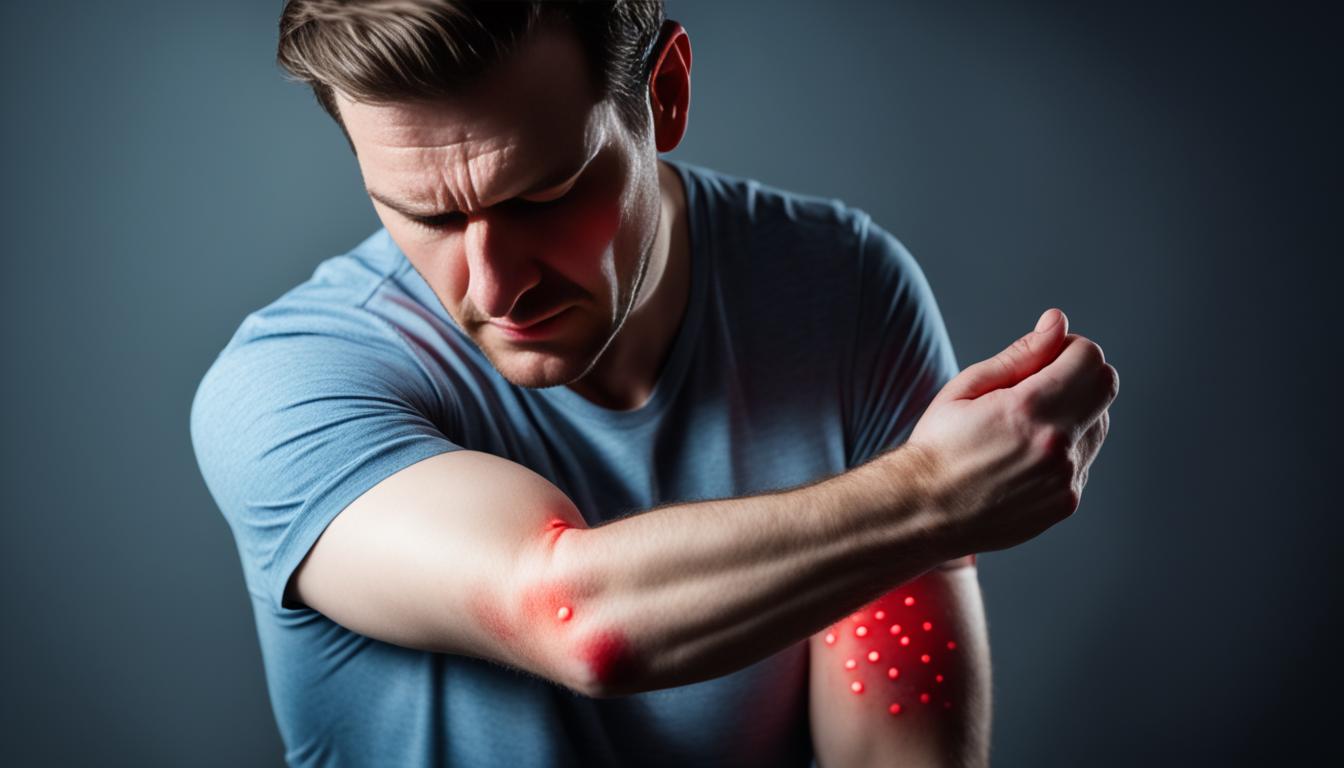Itchy skin, or pruritus, is a known issue caused by many things. It can be a constant bother or just sometimes. This problem can be frustrating and get in the way of everyday life. It shows up anywhere on the body and varies from a gentle tickle to intense discomfort. Knowing what causes it, how to diagnose it, and the treatments helps manage it.
Experts say itchy skin is common with lymphoma, especially Hodgkin and T-cell types. The treatments for lymphoma, like chemo and radiation, can also lead to itchiness. Dryness, redness, and irritation are typical for people with lymphoma. Other illnesses, certain drugs, and even dry skin alone can make you itch.
Key Takeaways:
- Itchy skin, also known as pruritus, can be caused by various factors.
- Lymphoma, both the condition and its treatments, can cause pruritus.
- Dry, sore, and itchy skin are common problems associated with lymphoma.
- Several underlying health conditions and medications can also lead to pruritus.
- Stem cell therapy is a promising treatment option for long-lasting relief of itchy skin.
Causes of Itchy Skin without Rash
Itchy skin without a rash has many causes. One is dry skin, known as xerosis. If your skin loses moisture, it gets itchy. Keeping skin moist with lotions can help.
Bug bites can make you itch without showing a rash. Mosquitoes or spiders leave irritants under your skin. This makes your immune system react, causing itchiness. Using anti-itch cream or antihistamines can make you feel better.
Some drugs might cause itching as a side effect. Opioids and certain blood pressure pills are examples. If you think your medicine is making your skin itch, talk to a doctor. They can suggest new drugs or ways to ease the itch.
Nerve problems might cause you to itch without a rash. This is called neuropathic itch. Abnormal nerve messages are to blame. Always see a doctor for a correct diagnosis. They can advise you on the best treatment for this type of itch.
If you have itchy skin without a rash, see a doctor for advice. They will do tests to find out what’s causing the itching. Then, they can help you with the right treatment.
Itching as a Symptom of Underlying Health Conditions
Itching is sometimes more than just a scratch. It can be a sign of underlying health issues. Paying attention to ongoing or severe itching is important. It could point to a hidden health problem. Various conditions may spark this uncomfortable feeling.
Nerve-Related Itch
Diabetic neuropathy and neurodermatitis are nerve conditions that may trigger itching. High blood sugar in diabetic neuropathy harms the nerves. This damage can lead to itching. On the other hand, neurodermatitis is a skin condition inflamed by nerves. It makes you want to scratch intensely.
Kidney Disease Itching
Itching in advanced kidney disease can occur without a rash. Failing kidneys let waste and toxins pile up in the body. This buildup might cause the skin to itch, particularly at night. The itchiness may come with other signs, like dry skin and feeling tired.
Liver Disease Itching
Cirrhosis and hepatitis are liver diseases that can cause itching. If the liver can’t clear out toxins, your skin may start to itch. This happens because there’s too much bile in your skin. The palms and soles of the feet can be especially itchy in this case.
Skin Cancer Itching
Itching can also warn of something serious like skin cancer. Early skin cancer itching comes with other hints, such as mole changes. Keep an eye on these signs and get checked if itching or new skin growths last long.
If you can’t shake the itch or the symptoms worry you, see a doctor. They can help diagnose and treat the underlying issue.
| Condition | Description | Treatment |
|---|---|---|
| Nerve-Related Itch | Itching caused by nerve-related conditions such as diabetic neuropathy and neurodermatitis. | Management of underlying condition, topical creams, antihistamines. |
| Kidney Disease Itching | Itching caused by advanced kidney disease. | Treating the underlying kidney disease, medications to relieve itching, dialysis if necessary. |
| Liver Disease Itching | Itching caused by liver diseases like cirrhosis and hepatitis. | Treating the underlying liver disease, medications to relieve itching, topical creams. |
| Skin Cancer Itching | Itching that can be an early sign of skin cancer. | Surgical removal of cancerous cells, chemotherapy, radiation therapy. |
Conclusion
Itchy skin, known as pruritus, can be quite bothersome. It’s often caused by various health issues, certain medicines, or just dry skin. Depending on what’s causing the itch, treatment choices can vary.
Using moisturizers can be a big help for dry skin, lessening the urge to scratch. Antihistamines help with allergies, calming the skin. for some, like corticosteroids, might be needed. But there’s also a new hope in stem cell therapy for lasting solutions.
Stem cell therapy aims to fix the problem at its source, by helping the skin renew itself. This new method is giving hope to many with itchy skin due to specific reasons. Seeing a doctor remains key to finding out why you’re itching and getting the best treatment for you.

